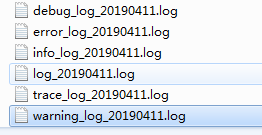C/C++记录执行程序日志的使用
作为一枚程序员好几年了,一直都没有自己的博客,感觉蛮遗憾的。很多知识点,都是当时使用才去了解,查资料,这样很不方便,也容易忘记。下了好大决心,才想着写一些自己的博客,来记录平时的一些容易忘的知识点,经验,和一些走过的坑,以后可以查阅,警醒。
Easyloggingpp的使用
对于有开发经验的程序员来说,记录程序执行日志是一件必不可少的事情。通过查看和分析日志信息,不仅可以有效地帮助我们调试程序,而且当程序正式发布运行之后,更是可以帮助我们快速、准确地定位问题。以前由于经常使用QT,所以使用都是QT自带的日志系统。这几天偶然发现了一个开源日志库Easylogging++,使用之后,感觉非常简单,而又轻量,还能兼顾性能,实是一种开发编码的利器。
Easylogging++项目在GitHub的开源地址:https://github.com/easylogging/easyloggingpp
GitHub上给出了一个简单示例代码:
#include "easylogging++.h"
INITIALIZE_EASYLOGGINGPP
int main(int argv, char* argc[]) {
LOG(INFO) << "My first info log using default logger";
return 0;
}这几行代码的作用:
- 包含easylogging++.h头文件
- 使用宏 INITIALIZE_EASYLOGGINGPP 初始化
- 使用宏 LOG(INFO) 开始日志记录
还可以通过自定义来设置日志的格式:
#include "easylogging++.h"
INITIALIZE_EASYLOGGINGPP
int main(int argc, char** argv)
{
el::Configurations conf("my_log.conf");
el::Loggers::reconfigureAllLoggers(conf);
LOG(TRACE) << "***** trace log *****";
LOG(DEBUG) << "***** debug log *****";
LOG(ERROR) << "***** error log *****";
LOG(WARNING) << "***** warning log *****";
LOG(INFO) << "***** info log *****";
system("pause");
return 0;
}其中配置文件 my_log.conf 的内容如下:
* GLOBAL:
ENABLED = true
TO_FILE = true
TO_STANDARD_OUTPUT = true
FORMAT = "[%level | %datetime] | %msg"
FILENAME = "log\\log_%datetime{%Y%M%d}.log"
MILLISECONDS_WIDTH = 3
PERFORMANCE_TRACKING = false
MAX_LOG_FILE_SIZE = 1048576
LOG_FLUSH_THRESHOLD = 0
* TRACE:
FILENAME = "log\\trace_log_%datetime{%Y%M%d}.log"
* DEBUG:
FILENAME = "log\\debug_log_%datetime{%Y%M%d}.log"
* FATAL:
ENABLED = false
* ERROR:
FILENAME = "log\\error_log_%datetime{%Y%M%d}.log"
* WARNING:
FILENAME = "log\\warning_log_%datetime{%Y%M%d}.log"
* INFO:
FILENAME = "log\\info_log_%datetime{%Y%M%d}.log"
* VERBOSE:
ENABLED = false效果:
QtMessageHandler的使用
一般情况下,在调试程序的时候,我们会输出一些调试信息,便于程序跟踪。
例如:
int main(int argc, char **argv)
{
QApplication app(argc, argv); // 打印信息
qDebug("This is a debug message.");
qWarning("This is a warning message.");
qCritical("This is a critical message.");
qFatal("This is a fatal message."); ...
return app.exec();
}
不过,这只能发送到控制台,或者调试器。。要写入日志文件的话,就需要我们自定义了。
例如:
//设置本地日志目录,以及日志名称
QString LogHandler::getLogFilePath(QtMsgType type)
{
QString fileName = "";
switch (type)
{
case QtDebugMsg:
fileName = QString("debug.log");
break;
case QtInfoMsg:
fileName = QString("info.log");
break;
case WyDetailMsg:
fileName = QString("detail.log");
break;
default:
fileName = QString("error.log");
break;
}
QString strFilePath = QStandardPaths::writableLocation(QStandardPaths::TempLocation);
strFilePath += "/logfile/";
QDir dir;
if (!dir.exists(strFilePath))
dir.mkdir(strFilePath);
strFilePath += QDateTime::currentDateTime().toString("MMdd_");
strFilePath += fileName;
return strFilePath;
}
//自定义消息处理程序
void LogHandler::messageHandler(QtMsgType type, const QMessageLogContext &context, const QString &msg)
{
static QMutex mutex;//设置锁,多线程使用
mutex.lock();
QString strFilePath = getLogFilePath(type);
QString strType = "";
switch (type)
{
case QtInfoMsg:
strType = QString("Info:");
break;
case QtDebugMsg:
strType = QString("Debug:");
break;
case QtWarningMsg:
strType = QString("Warning:");
break;
case QtCriticalMsg:
strType = QString("Critical:");
break;
case QtFatalMsg:
strType = QString("Fatal:");
break;
default:
strType = QString("Debug:");
break;
}
QString date_time = QDateTime::currentDateTime().toString("MM-dd hh:mm:ss.") + QTime::currentTime().toString("zzz");
QString current_date = QString("[%1]: ").arg(date_time);
QString message = QString("%1 %2 %3").arg(current_date).arg(strType).arg(msg);
//写入日志文件
QFile file(strFilePath);
if(file.open(QIODevice::WriteOnly | QIODevice::Append))
{
QTextStream text_stream(&file);
if(msg.isEmpty())
text_stream << "\r\n";
else
text_stream << message << "\r\n";
file.flush();
file.close();
}
mutex.unlock();
}接着需要在main函数中安装日志log处理函数:
qInstallMessageHandler(messageHandler);效果:
结语:
在目前开源的C++日志库中,并没有一个在使用份额上占绝对优势的,像log4cplus和glog,这两个库都比较成熟了,而且网上教程也很多。不过我都没怎么使用过这俩个库,就不多做介绍了。第一次写博客,也参考了一些其他文章,就先这样了,有人看的话,多多担待。

